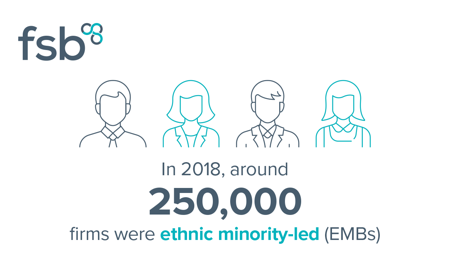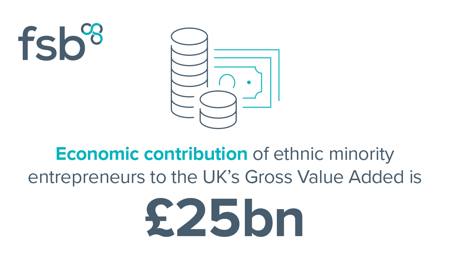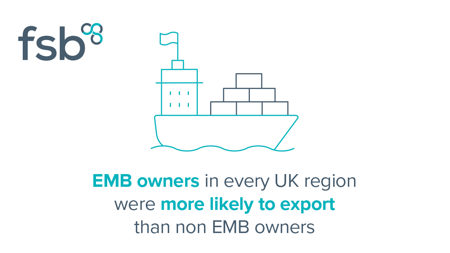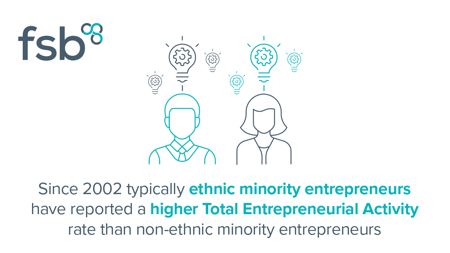Introduction
A thriving economy needs to engage with all communities regardless of ethnic heritage, race, religion or nationality to maximise its full growth potential. This report collated by Aston Business School brings together a number of key sources of new information and analysis on the health of the ethnic minority business population in the UK to support wider debate and policy formulation.
The report comprises three sections of data and analysis:
- An overview of the latest estimates of the ethnic minority business numbers and their economic contribution;
- An in-depth look at the contribution of people with an ethnic minority background to the UK’s enterprise activity;
- New research on the contribution of ethnic owned businesses to exports, innovation and growth, all of which can help to solve the UK productivity puzzle.
While each section can be used on a standalone basis, it is hoped that by bringing these different areas of analysis together it will provide an important point of reference to assist wider debate on the role of ethnic minorities in UK commercial life from an economic and social perspective.
Where possible, if findings made after data analysis could have an explanation by referencing other research, this connection has been made. However, not every line of enquiry leads to such an outcome. Often, we do not have an immediate answer, commonly because the data is not available
and the research has not been done. Indeed, the report concludes with a summary of current issues facing the ethnic minority business community and how new research and data could help this important part of the UK economy and society reach its full potential.

Key Findings
For our key findings in full, statistics and references download our full report.




Economic Contribution: Creating Wealth in Communities



Recommendations
Click on each recommendation to find out more
Conduct a comprehensive and regular national level study of ethnic minority entrepreneurship.
A comprehensive and regular national level study of ethnic minority entrepreneurship should be conducted, comparing the propensity for entrepreneurship along with improving data collection on ethnic minority groups that form part of the UK business population.
Currently the ethnic minority categorisations being used (outside of the Census), in relation to the business population, are too broad, which prevents granular analysis between different types of ethnic groups, such as Asian Indian, Asian Bangladeshi, Black African or Black Caribbean, as opposed to broad ethnic groups such as Asian/Asian British.
The current White ethnic group is also too broad, which makes it challenging to assess trends in businesses set up by EU migrants without reference to nationality data. These groupings are too broad to support the granular analysis required. That is why we want to see more precise ethnic groups categorisations used as part of the Annual Population Survey (APS) which runs every year. As well as greater disaggregation of ethnic groups in relation to cross benchmarking data, it would also be helpful to refine the categorisations of ethnic groups within longitudinal data.
This could be achieved through refining the categorisation of ethnic minority groupings in Global Entrepreneurship Monitor (GEM) Longitudinal Small Business Survey (LSBS) and/or developing an ethnic marker within the Inter Departmental Business Register (IDBR) which provides the main sampling frame for surveys carried out by the ONS.
A final important consideration is that the bulk of the minority ethnic group population in the UK have now been born in Britain. This is reflected in the fact that the mixed heritage category is the most rapidly growing in Britain. The ‘mixed’ group is projected to continue increasing significantly. If the categories used by agencies to collect data on the self-identified ethno-cultural characteristics of the population do not reflect salient terms, the process may give rise to social groups which are artificial, with no real meaning. This lack of meaning will automatically be carried over into a number of official data series of ethnic minority labour market and business activity.
Improve ethnic minority access to external finance
FSB is calling on Government to introduce a dedicated scheme to help ethnic minority-led businesses to access external finance. Alongside awareness-raising, a dedicated scheme – similar to the now defunct Aspire Fund – would help more ethnic minority-led businesses access the finance they need to grow.
Government should commit to promoting these schemes as widely as possible, ensuring those who can benefit the most are fully aware of opportunities.
Support small business innovation
Our research shows that ethnic minority small businesses are more likely to engage in process, product and service innovation than non-ethnic minority firms. In 2018, nearly 21 per cent of EMBs reported recent process innovation, six percentage points higher than the rest of the respondents. The results for product or service innovation were even stronger in favour of ethnic minority-led firms than non-ethnic minority firms to the value of 11 percentage points.
To support ethnic minority businesses to recover from the COVID-19 crisis, it is vital that Government supports new to firm innovation. That is why we are calling on the Government to support small businesses that have adopted and would like to adopt new digital technologies by widening the definition of Research and Development (R&D) and introducing digital vouchers for small businesses.
Currently there are a plethora of initiatives to support new-to-market innovation, such as the R&D tax credit and Innovate UK grant programmes but very little financial support for new-to-firm innovation. The Business Basics Scheme is a step in the right direction but the current crisis requires an
intervention of a different order of magnitude. As our research shows new to firm digital innovation will be even more important to enable smaller businesses to adapt to social distancing and to recover. That is why we need to see both a widening of the definition of the scope of ‘development’ within R&D tax credits and the introduction of digital vouchers for smaller businesses seeking to enhance their adoption of digital technologies.
In March 2020, the Government announced it would consult on whether expenditure on data and cloud computing should qualify for R&D tax credits. Changes to the tax system are welcome, but it is also essential that immediate support is made available to small businesses that need to adopt digital technologies in the here and now.
Introduce export vouchers to support the full utilisation of future Free Trade Agreements across the globe (including the Commonwealth).
It is widely acknowledged that exporting to emerging markets entails higher costs (for example, for utilising the services of intermediaries). Our research shows that ethnic minority led businesses are more likely to export than non-ethnic minority firms. Equally ethnic minority firms that do not export are significantly more likely than non-exporting non-ethnic minority firms, to state they plan to export in the future.
Ethnic minority business owners may see opportunities in securing trading links with their countries of origin or their parents’ origin, utilising their cultural understanding to generate business. The highest intention to export (21% in 2015 and 23% in 2018) was demonstrated by Black/Black British-led businesses. The UK Government should increase its focus on ethnic minority businesses and trade.
Introducing export vouchers for small businesses seeking to export, for the first time, to emerging markets - could have a disproportionately positive impact on ethnic minority entrepreneurs.
Ensure ethnic minorities are a key part of Government sponsored campaigns designed to boost exporting
Ensure ethnic minorities are a key part of Government sponsored campaigns designed to boost exporting. Government intervention, perhaps as part of the GREAT campaign, should facilitate successful ethnic minority exporting entrepreneurs sharing their stories and tips and effectively acting as role models.
This could have a significant effect in enhancing ethnic minority entrepreneurship.
Improve the accessibility of business support through collaboration with national and local community-based organisations, which are able to reach out to ethnic minority business owners in our most diverse communities
It is important that business support is accessible locally and is comprehensive, providing support on areas such as, access to finance, leadership and management training, international trade and support to build and develop new skills.
he ability to provide this level of support is likely to have a significant impact with hopeful young entrepreneurs and those with portfolio careers. With an upcoming Spending Review – there is an important opportunity to revitalise the business support landscape in England.
This is particularity important to supporting a post Coronavirus recovery. It is crucial that formal business support is accessible to all entrepreneurs, particularly given the importance of the Levelling Up agenda. This means that state funded channels of business support, such as Growth Hubs, Be the Business, Business Basics – interact with community-based organisations to increase their outreach and appeal.
Support the self-employed in learning new skills to facilitate high quality self-employment
Our research shows that the self-employment rate particularly in the Bangladeshi (19%) and Pakistani (25%) communities is higher than the all populace average rate of 15 per cent. Ensuring that the self-employed can progress into high quality self-employment or employment is important.
One major inhibitor, is that the self-employed cannot utilise a tax break to mitigate the costs of learning a new skill. The Government has recognised this problem and in 2018 announced a £10 million pilot project in Greater Manchester, in partnership with the FSB, to test what forms of Government support are most effective in increasing training levels for the self-employed. The pilot, Enterprising You, was launched in February 2020. However, COVID-19 has disrupted the project. FSB encourages Government to continue its commitment to this project.
Support those entering self-employment. The New Enterprise Allowance (NEA) should be scaled up, to play an important role in supporting the long term unemployed, on state benefits, into employment.
The Government’s Race Disparity Audit findings uncovered a race employment gap of nearly 12 percentage points between White and non-white groups, as well as lower rates of pay and career progression, in 20172.
The NEA was initially rolled out across Great Britain between April and August 2011. The scope of the scheme has been expanded several times since it was first announced.3 The COVID-19 recession is likely to worsen the employment gap between ethnic minorities and non-ethnic minorities. Self-employment can play an important role in helping a person ultimately into business ownership or into employment.
It is vital that Government maintains its commitment to the NEA, and looks for opportunities to scale it up in terms of profile and applicants to be ready for the increase of those on Universal Credit in the wake of COVID-19. The Government should also consider creating effective mentoring circles for ethnic minority women who have experienced long-term unemployment and who may have English as a second language.
This should be rolled out across the JobCentre Plus network, similar to the current initiative for ethnic minority youth jobseeker plus claimants. The aforementioned initiatives for ethnic minority youth jobseekers should also be expanded, given the disproportionate impact the COVID -19 crisis is having on youth unemployment. We welcome the recent increase in mentoring spaces, but believe more needs to be done.
Ensure diversity and social value is part of the public procurement framework
We want to see ambitious strategies for engaging ethnic minority businesses in public sector procurement supply chains. This must include measurement and reporting of ethnic minority business on-boarding onto public sector frameworks and contracts.
The involvement of ethnic minority businesses in this way requires culturally appropriate engagement via trusted intermediaries within ethnic minority
communities, especially to overcome communication barriers.
Understand and enhance the social impact of smaller businesses in their communities.
This report shows the crucial role that many ethnic minority firms play in supporting their local communities. The Government must recognise the wider social impact of small businesses – beyond the economic – in tackling key societal issues such as ageing demographics, loneliness, wellbeing and social mobility.
That is why we are calling on the Government to consider the potential for ‘Community Zones’ (following the model of Enterprise Zones). For small businesses operating outside urban centres and business hubs, the costs of doing business are often greater due to poor infrastructure, cost of transport and lack of economies of scale. However, these small businesses have a significant social impact and support their communities to be more resilient.
Occupational health support plans should be accelerated and Government should explore the potential for tax breaks to incentivise occupational health support for the self-employed and small businesses.
Owning and running a business can be hugely rewarding. However, it brings with it demands, responsibilities and risks that can bring personal pressures that can impact a person’s health and wellbeing. In addition, research suggests that Black and minority ethnic communities are at comparatively higher risk of mental ill health, and disproportionately impacted by social detriments associated with mental illness.
Introduce a one-year employer national insurance contribution holiday for SME’s that recruit from labour market disadvantaged groups.
Our analysis suggests an EMB employer population in 2018 of around 63,000 firms (26% of all firms), is more common than in the business population
as a whole. It is well established small businesses are disproportionately likely to employ from disadvantaged groups compared to larger employers.
Ensure the new points-based immigration system works for self-employed and small businesses
The Global Talent visa which was introduced in February 2020 should benefit the self-employed and enable self-employed individuals to support the growth of UK businesses and contribute to innovation in the UK. The MAC’s January 2020 report recommends the Tier 1 Exceptional Talent should also take into account the potential of applicants, not only an applicant’s established exceptional talent. FSB supports this view and we also recommend the Government considers talent beyond the areas of science and technology.
FSB seeks to work with Government in expanding the range of areas in which a Tier 1 Global Talent visa may be awarded thus ensuring the UK is open to a range of talented individuals from across the world. The Innovator visa was introduced on 1 April 2019, however, since its introduction, only 14 Innovator visas have been granted. An applicant may only be successful if their idea is ‘innovative’ and therefore endorsing bodies are focused on digital technology industries, and while the technology sector is important, these strict requirements may be excluding other successful entrepreneurs.
Many of the UK‘s most successful businesses began as micro businesses started by entrepreneurial migrants. FSB wants to see this entrepreneurialism continue unabated; the Government should, therefore, commit to reviewing the Innovator visa within 18 months to ensure the eligibility rules are reasonable and protect the UK’s borders.





